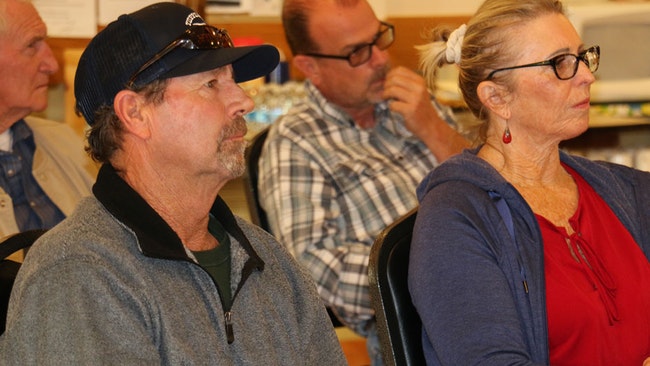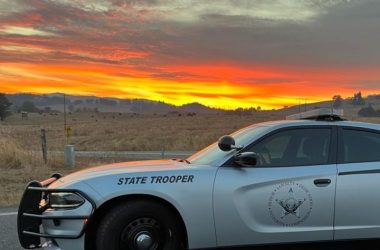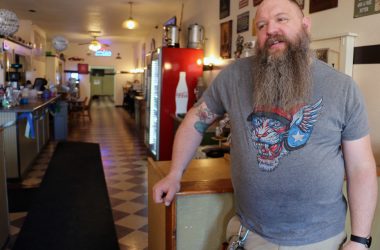
A crowd of about 40 people attended the town hall meeting at the Vale Senior Center Nov. 3 to listen to State Sen. Lynn Findley, R-Vale and State Rep. Mark Owens, R-Crane, talk about a variety of issues. (The Enterprise/PAT CALDWELL).
VALE – Two state legislators discussed a range of issues during a town hall meeting at the Vale Senior Center last week.
State Rep. Mark Owens, R-Crane, and state Sen. Lynn Findley, R-Vale, gave short presentations and answered questions from a group of about 40 local residents during the session Nov. 3.
The two lawmakers fielded questions that ran a gamut from education to more local control on setting speed limits through towns to congressional and legislative redistricting plans.
Findley kicked off his presentation by reminding the crowd that Oregonians will get a rebate on their 2020 Oregon income tax as part of the state’s kicker tax credit law. Under the law, Oregon residents get a rebate when the state’s revenues exceed by 2% what was originally calculated.
Findley said a “considerable amount of work” is going on in an effort to make U.S. Highway 20-26 safer. Findley also said safety is one of the main themes pushing the state Transportation Department to build a roundabout at Cairo Junction. A roundabout is a circular intersection or junction that channels traffic around a central island.
One resident asked if the state considered how big agriculture vehicles will negotiate the roundabout.
“More works needs to be done,” said Findley.
Findley said lawmakers are also working to establish more local control to set specific speed limits through small towns.
Another question touched on the potential impact of an ambitious federal conservation plan – dubbed the River Democracy Act – sponsored U.S. Sen. Jeff Merkley and U.S. Sen Ron Wyden.

State Rep. Mark Owens, R-Crane, answers a question from the crowd at the town hall meeting at the Vale Senior Center Nov. 3. (The Enterprise/PAT CALDWELL).
“We are coming out against it. We are pushing back on it,” said Owens.
Findley lamented how the Oregon Legislature dealt with a redistricting plan passed into law in September.
The final legislative and congressional redistricting plan – completed to reflect new U.S. Census figures – was contentious and did not involve voters in a meaningful way, said Findley.
The new legislative and congressional maps now face a court challenge.
“So, we will see how that plays out,” said Owens.
Owens said a better plan for redistricting would be to create a non-partisan committee to tackle the issue.
Findley and Owens were asked about the proposed plan to shift a number of rural Oregon counties into Idaho.
Malheur County voters passed a measure in May to require the county court to meet three times a year to discuss how to promote the county’s interest in any future negotiations about expanding Idaho’s border west.
“It’s a pretty big lift,” said Findley.
A state boundary change will require the approval of the Idaho and Oregon legislatures and Congress.
“The odds of it happening are slim,” said Owens.
Findley said the concept to move Malheur County into Idaho can trace its roots to “extreme frustration.”
One county resident asked about holding the Oregon Department of Education accountable and pointed to a recent decision by the Ontario School District to cut its instruction schedule to four days a week.
“We will start pushing back on this,” said Owens.
A question about state vaccination mandates prompted Owens to voice his displeasure regarding how Gov. Kate Brown is handling the Covid pandemic.
Owens said the governor is still issuing edicts regarding Covid restrictions under a state emergency declaration.
“There are no checks and balances,” said Owens.
The Covid pandemic and vaccines also triggered a question about why the two issues are so politicized.
“It is a sad situation where our country and state look at everything through a political lens,” said Owens.
Findley told the crowd to remember that most of the work completed at the Legislature is bipartisan.
“We talk about divisions a lot but when you take a look at all the bills, 90% are bipartisan. There is another 5% where you have to work together,” he said.
News tip? Contact reporter Pat Caldwell at pat@malheurenterprise.com.
Previous coverage:
Malheur County legislators call on governor to show science behind new school order
Students, staff and legislators react to mask mandate in schools
EXCELLENCE IN JOURNALISM – Available for $5 a month. Subscribe to the digital service of the Enterprise and get the very best in local journalism. We report with care, attention to accuracy, and an unwavering devotion to fairness. Get the kind of news you’ve been looking for – day in and day out from the Enterprise.




